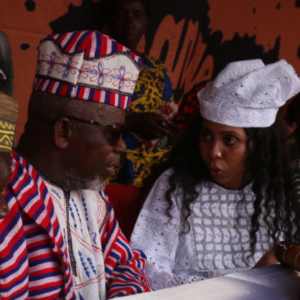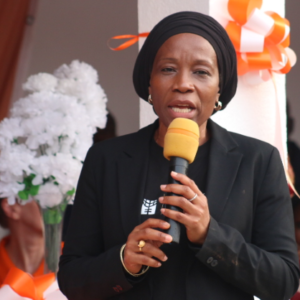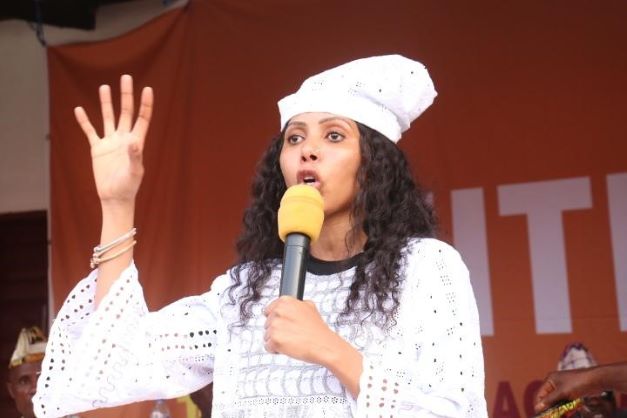PHOTO: Jaha Dukureh, UN Women’s Goodwill Ambassador addressing the audience in Gbanquoi, Nimba
By Evelyn Kpadeh Seagbeh
United Nations Women Goodwill Ambassador, Jaha Dukureh has told women, traditional leaders, and government representatives that she will lobby with the UN Women, and other International partners to raise funds for the construction of a dormitory or housing for the newly constructed vocational heritage center in the area.
“I am going to leave from here being an advocate for you in the same way I support my community in The Gambia is the say way I will now support this community and Liberian women as well,” the UN Goodwill Ambassador said on Wednesday
Jaha continued: “With regards to this heritage center we would love to see the women start to use it as soon as possible, but I also think it’s important that you have the dormitories where you will be sleeping at”. Jaha told traditional leaders and zoes
Dukureh made the commitment in Gbanquoi as part of her visit to Liberia on a campaign to join Liberia as part of efforts to end female genital Cutting or Mutilation (FGM) as Liberia joins countries around the world to observe the 16 days of Activism.
At a ceremony held at the newly constructed heritage center, which brought together hundreds of women, traditional, local residents, national leaders, women zoes, and the head of Liberia Traditional Council, Chief Zanzan Karwah pleaded with Jaha to have housing facilities constructed for the 75 women zoes the heritage center is constructed for.
The construction of the housing Chief Karwah said will be the most effective way to have the women’s zoes transition from the bushes,and would ease the stress of them walking several miles from their villages to the center.
“I want to thank UN Women and all their partners for this center even though at the right time we will come back here to dedicate this place. I like this place and even the water system that is running all over.”
“On behalf of my indigenous people, we want to appeal that after the women finish doing their work for the day, they need a place to lay their head and they need to go to the hospital, so I am asking for your to please put sleeping place and hospital for women and for the children,” Chief Zanzan karwor told Jaha Dukureh as saying.

Chief Zanzan Karwor in Conversation with Jaha Dukureh in Gbanquoi after his address
But chief Zanzan Karwar did not, however, say whether or not the women zoes have accepted to abandon the practice.
On the downside, some of the women zoes this paper spoke with in Gbanquoi said they had no idea as to whether the newly constructed heritage center was meant to replace their traditional practice of female cutting (circumcision).
The vocational and Heritage Center is one of 4 centers constructed by UN Women in Nimba County under the European Union, United Nations, and Government of Liberia Spotlight Initiative; to provide alternative economic livelihood programs to traditional practitioners in an effort to eliminate female genital mutilation cutting in Liberia.
The center will serve as a delicate learning center for traditional practitioners and women and girls to learn new skills to enable them to get an alternative source of income to replace FGM.
With the launch of the Spotlight Initiatives in December 2019, UN the Women says it has trained 300 traditional practitioners from each of its 4 spotlight counties including Gbanquoi, Nimba County where 75 women zoes are expected to directly benefit from the Heritage center.
Jaha Dukureh, a Gambian is a survivor of child marriage, and female genital cutting or female genital mutilation (FGM). She says she was just 1 week old when her parents had her taken to a traditional woman who had her genitalia cut off.
At fifteen years of age, she says she was forced to marry a man that was almost more than 3 times her age.
This horror of her life has since put her on the frontline of leading campaigns not just in her country, The Gambia to end FG and child marriage, but globally.
As part of her ongoing visit, Jaha Dukureh is holding talks with stakeholders and sharing the stories of her life how she was subjected to FGM as a baby, her advocacies that led the Gambian government to outlaw the practice of FGM,and sharing lessons Liberians can learn in helping to make the breakthrough for Liberian girls and women to end female circumcision.
Being cognizant of the resistance that comes with the discussions about ending FGM for the most part, Jaha in her response told Chief Zanzan Karwor and the audience that one of the ways to get African Women out of poverty is through economic empowerment and putting money into their hands by supporting different means of livelihood.
At the one-day event, Jaha also announced her plan to help raise money for Liberia for the construction of additional heritage centers in the other 7 FGM practicing counties that don’t have any.
“Personally, I will have conversations with UN women, but I am also making a personal commitment to raise money for Liberia so that the other 7 counties that don’t have heritage centers can have it so Liberia can be free of all violence against women and girls.”
For her part UN Women’s Country Representative, Comfort Lamptey praised the leaders in Nimba County for making progress in the efforts to end FGM of all the 11 counties that practice FGM.

UN Women Country Rep. Comfort Lamptey
“Let Liberia be an example to the whole world to show that we in Africa have traditions that are important that we are preserving and we know also when it’s time to let go of those that are harmful to girls. I also want to challenge Nimba County to say within Liberia it will be the model county in eliminating FGM truly, honestly, and fully,” Lamptey told the gathering.
The Sande is one of Liberia’s traditional societies where girls spend six months in the bush schools learning to be good wives. It includes the painful procedure of genital cutting, which removes part or all of the clitoris. It often leads to infection, bleeding, and death and gives the woman lifelong health problems including trouble in childbirth.
Because of the threats from traditional practitioners, that make girls believe that when they explain what happened in the bush school they will die, girls and women who survive FGM are often reluctant to talk about the cutting and its related consequences.
For several decades, and still present, Liberia has had no law criminalizing female genital cutting. Liberia is one of the 29 countries in Africa where female genital cutting is still widely practiced.

